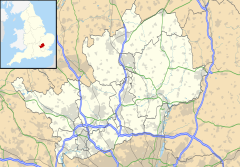Stocking Pelham
| Stocking Pelham | |
|---|---|
 St. Mary's Church, Stocking Pelham | |
Location within Hertfordshire | |
| Population | 163 (2011 Census)[1] |
| OS grid reference | TL4529 |
| District | |
| Shire county | |
| Region | |
| Country | England |
| Sovereign state | United Kingdom |
| Post town | BUNTINGFORD |
| Postcode district | SG9 |
| Dialling code | 01279 |
| Police | Hertfordshire |
| Fire | Hertfordshire |
| Ambulance | East of England |


Stocking Pelham is a village and civil parish in the East Hertfordshire district of Hertfordshire, England. It is located on the border with Essex, around 6 miles (10 km) east of Buntingford. The village is one of the three Pelhams, along with the nearby Brent Pelham and Furneux Pelham. Stocking Pelham is home to St. Mary's Church in the Church of England Diocese of St Albans.[2] The aerial view of Stocking Pelham shows that the settlements are sparsely positioned from one another. Close by the village is a major electrical substation of the National Grid.
Population
[edit]Stocking Pelham had a population of 163 according to the 2001 census[3] and the total population was also 163 in 2011.[4] Historically speaking, much of Stocking Pelham was rather heavily dependent on agriculture for income and in some cases this is still apparent. Considering the nature of the environment this may explain why there are now many retired citizens residing here.[5]
History
[edit]In the 1870s the location of Stocking Pelham was described as:
"a parish in Bishops-Stortford district, Herts; adjacent to Essex, 5¼ miles N W of Stanstead r. station, and 6 miles E of Buntingford."[6]
The 1881 Occupational Structure of Stocking Pelham is illustrated in a pie chart below. The chart shows that 46% of the residents at the time were employed in the agricultural sector, hence there was a clear reliance on agricultural labour. In fact, Stocking Pelham was almost completely dependent on primary sector labour with a small fraction of 5% working in 'Professional Labour'.[7] Although, the 2011 Occupational Structure of Stocking Pelham, also depicted in a pie chart below, in accordance to Neighbourhood Statistics shows that since the 19th century, Stocking Pelham has since broke from its dependence on primary sector labour. In comparison to the 1881 Occupational Structure, citizens are no longer heavily dependent on agricultural labour as a means of income and are now harbouring a more diversely skilled workforce, of which 26% are employed in professional occupations and 19.5% are employed as managers, directors and senior officials. The remaining 54.5% of the workforce are reported to be working within the tertiary and secondary sectors.[8]
Electrical grid substation
[edit]The 40 acres substation was built from 1964, by Balfour Beatty at Crabb's Green Farm, south-east of the village. Much haulage traffic came through nearby Manuden. Two 215-ton transformers were delivered, requiring roads to be strengthened, and street lights moved.[9] The substation cost £4m.[10] The transformers were delivered on Wednesday 10 November 1965 at Tilbury docks, having left Manchester on Monday, being built at AEI on Trafford Park[11] Switchgear was supplied by A. Reyrolle & Company. The substation is on the Hertfordshire - Essex border, with the eastern half in Berden in Essex.
St. Mary's Church
[edit]St. Mary's Church has a tiled chancel roof and a nave which date back to around 1360. In either the late 14th or the early 15th century, a narrow aisle was added which required a widened nave. Both the eastern and southern walls of the chancel were re-built in brick in the 19th century.[12]
Notoriety
[edit]The village is notorious for its association with both the kidnap and murder of Muriel McKay and being the home of Christopher Docherty-Puncheon, who shot Lieutenant Colonel Robert Workman, on his doorstep in nearby Furneux Pelham, Hertfordshire, in an "execution-style" killing in 2004.[13]
See also
[edit]
References
[edit]- ^ "Civil Parish population 2011". Neighbourhood Statistics. Office for National Statistics. Retrieved 2 November 2016.
- ^ "A Church Near You: St. Mary, Stocking Pelham". achurchnearyou. Archbishop's Council. Retrieved 18 April 2016.
- ^ "Stocking Pelham: Key Figures for 2001 Census: Key Statistics". Neighbourhood Statistics. Office for National Statistics. Retrieved 4 February 2016.
- ^ "Stocking Pelham: Key Figures for 2011 Census: Key Statistics". Neighbourhood Statistics. Office for National Statistics. Retrieved 11 April 2016.
- ^ "St Mary The Virgin, Stocking Pelham". St Andrews Much Hadham. St Andrew's Much Hadham. Retrieved 23 April 2016.
- ^ Wilson, John Marius (1870–72). Imperial Gazetteer of England and Wales. Edinburgh: A. Fullerton & Co.
- ^ "1881 Census of England and Wales, Tables: Ages, Condition as to Marriage, Occupations and Birthplaces of people, Table 10: " Occupations of Males and Females in the Division and its Registration Counties". Vision of Britain. Retrieved 21 April 2016.
- ^ "Stocking Pelham: Occupation, 2011". Neighbourhood Statistics. Neighbourhood Statistics. 2011. Retrieved 23 April 2016.
- ^ Herts and Essex Observer Friday 21 February 1964, page 10
- ^ Herts and Essex Observer Friday 12 June 1964, page 2
- ^ Herts and Essex Observer Friday 12 November 1965, page 15
- ^ "An Inventory of the Historical Monuments in Hertforshire". British History Online. His Majesty's Stationery Office. 1910. Retrieved 22 April 2016.
- ^ "Convicted murderer jailed for shooting dead retired army officer". The Guardian. 5 November 2012. Retrieved 17 February 2022.
External links
[edit]- Photograph of the Cock, 1996
 Media related to Stocking Pelham at Wikimedia Commons
Media related to Stocking Pelham at Wikimedia Commons

